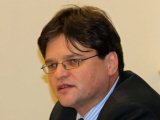An Interview with Christian Koch, Director of International Studies at the Gulf Research Center
29 May 2013
The demand for education and research services in the Gulf region is growing. What is the role of the Gulf Research Center in this regard?
The Gulf Research Center was established in 2000 in order to fill a need. We wanted to open a center that provides people with trustworthy information about developments in the Gulf region and, at the same time, offers a perspective from the region about broader issues and debates in the greater Middle East.
Our slogan “Knowledge for All” captures this desire well. Yes, we are a policy-centered think tank that tries to influence decision-makers, but we also seek to work across a broad spectrum of society. That means we try and work with the business sector, with politicians, with the academic and scholarly community, and with the media – but, perhaps most importantly, we also try to engage with the young people and students of our region. (If you recall, the Gulf region has a huge percentage of young people, many of whom are pursuing higher educational programs.) So, these are the various kinds of people we want to reach and we try to make sure that they have the information they need to draw knowledgeable conclusions and make well-informed decisions.
What are the consequences of the Arab uprisings for the work of the GRC?
The Arab Spring and its spin-offs are, of course, having an immense impact on our region as a whole. No country or society has been impervious to its effects, which puts a premium – yet again – on Gulf residents and the Arab world in general getting good quality information. Since the situation is complex, there is a lot of confusion and misinformation in the air. Too many things are making their way into the news much too quickly. As a result, an independent research organization like the GRC has an important role to play in providing background information about ongoing developments. These developments must be put in their proper context, which is what we do. But the Arab Spring has also underlined to us all that we need more research centers in the Gulf and about the Gulf. Strengthening the role of civil society in the region is something that is very important to the GRC and it requires more research centers much like ours.
How do you see the relationship between Europe and the Gulf region, in particular with regard to education and information exchange?
There has been a lot of progress in recent years. The institutional ties between Europe and the Gulf have strengthened, including in the area of education. For example, the European Union is sponsoring programs like the Erasmus Mundus scholarship program, which now has a “Gulf window” that allows students from the region to study in Europe. Additionally, we at the GRC have conducted a number of EU-related and sponsored workshops that have aimed to answer important education-centered questions. For instance: How do you build up a European Studies program at Gulf universities? And in turn, how do you focus more on Gulf studies at European Universities?
So, the points of contact are really growing between the two sides and exchanges between students, teachers and administrators are increasing as we speak. There still exists a lot of unexploited potential and a lot remains to be done, but things are definitely moving into the right direction.

